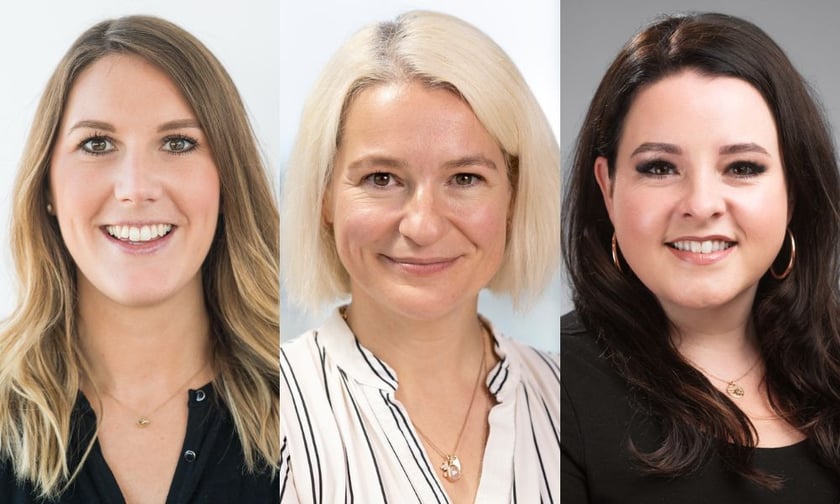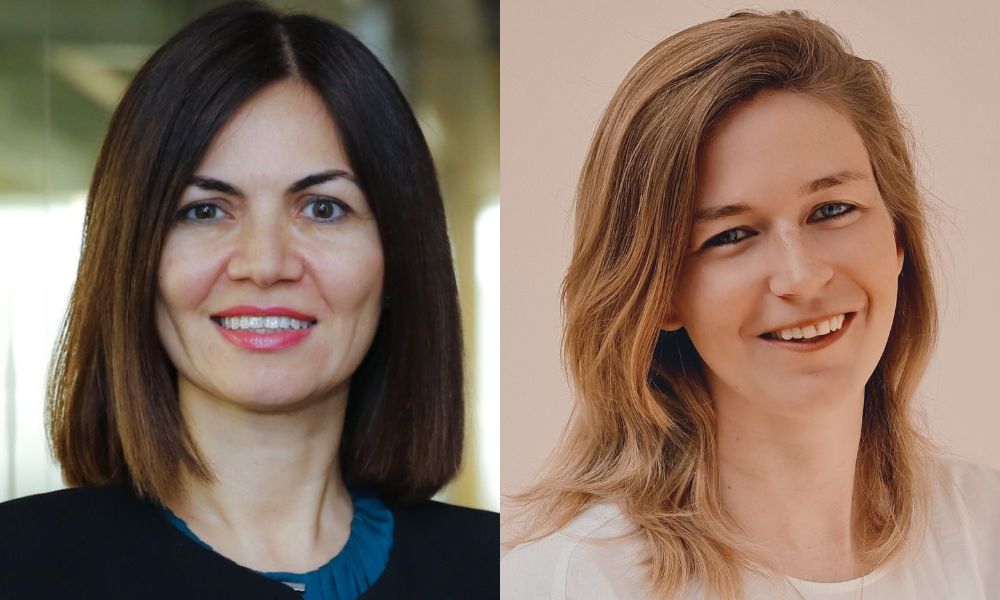

“I fell into insurance.”
It’s a familiar refrain for anyone who works in the sector – yet no matter their route to the market, those in the industry tend to stay after discovering its variety, opportunities and energy.
But what is the defining perception of the insurance market – and how does this change over time? In light of International Women’s Day – also celebrated by Insurance Business with the release of today’s Elite Women 2024 report – representatives from brokers, insurers, MGAs and insurtechs alike joined together to offer their insights.
For Philippa Berry (pictured above, left), cyber product leader at CFC, her perception of the industry was marked by how little exposure she’d had to insurance before joining the market. Having purchased personal insurance policies, only when required to do so, she said, she saw insurance as a necessary thing but not necessarily something she would ever have to use.
“I recognize this indifference to the industry now,” she said. “When I’m asked what I do for a living, and on responding to say ‘I work in insurance’, I can see I’ve lost the interest of who I’m talking to… or I prepare to politely answer their questions about why their car insurance premium has increased!”
Also largely unfamiliar with insurance when she joined the market was Caroline Dunn (pictured above, center), chief underwriting officer at Zurich UK. Having done an engineering degree, she said, her key driver when looking for a job was finding something flexible. She thought it was important to find somewhere to gain some experience, while having the opportunity to try a few different things and figure out what she liked the most – insurance provided that opportunity.
“I had an opportunity at RSA on their graduate program,” she said. “I didn’t know what to expect going in, I wasn’t aware of the breadth of the different products and services in insurance. There is also such a wide variety of customers, and I think, to begin with, I didn’t realize how interesting insurance could be. Finally, I’d never really worked in an office before, so it was all new territory for me.”
When Anna Beadsmoore (pictured above, right), partner – real estate at McGill and Partners, ventured into the world of insurance in 2010, her initial perception was one of a profession built on faith and trust. Yet when she was preparing to embark on her insurance journey, she too encountered the all-too-familiar reaction of “insurance? How boring.”
“[That] made me nervous because I do not do well being bored,” she said. “Then came the warnings about its male-dominated nature, I remained unfazed. Having navigated through male-dominated environments during my upbringing and academic pursuits in business, I felt adequately prepared to tackle any challenges head-on.
“Interestingly, having a sister already in the industry provided me with valuable insight and guidance, shaping my early experiences and continuing to influence my career trajectory. Although our paths within the industry are totally different, our shared perceptions and encounters have been staggeringly similar.”
Özlem Özüner (pictured below, left), head of operations & finance e-commerce at Allianz Trade, had a different route into the market as she was a banker before she joined the insurance firm in 2011. Her perception of the insurance sector was similar to that of banking, she said - that it was an industry that was needed but not liked, where services are used but not trusted.
“At the time,” she said, “I felt the insurance sector had not addressed the rising expectations of customers and did not innovate. I also saw that there were few female insurance executives and the talent pipeline for women was limited. Having been a part of the insurance sector for close to 15 years now, I have seen first-hand how that has changed.”
The idea of a career in insurance was not an enticing one for Sophia Pilkington-Miksa (pictured below, right), group VP of product at ManyPets, who shared that she was initially very reluctant to join the then-named Bought By Many. That’s because it was insurance, she said, and the perception was that it was dry, complicated and slow.

A grudge purchase category was especially unappealing, she said, particularly in the context of an industry which seemed to have made few inroads towards changing that experience.
However, Pilkington-Miksa noted that while insurance is complicated, that has turned out to be a very good thing. Being able to translate a complicated grudge purchase into a value-add for humans (and pets!) has been one of the most rewarding things to be involved in, she said, and that’s because it’s so hard.
“Innovation in insurance is absolutely possible - our regulatory environment is intentionally principle driven - to enable that freedom in pursuit of better customer outcomes,” she said. “While being an MGA inevitably means investing time and care in our carrier relationships, I’ve found our partners to be as innovation-hungry as we are.
“I joined Bought by Many a reluctant freelancer, and am here seven years later for a reason - I’m always learning new things.”
For Dunn, who joined the industry looking for variety, insurance has provided that in spades. Throughout her career, she has been able to try out a lot of different business areas, she said, including a stint in marketing which she quickly discovered was not the right fit for her. Instead, she found her passion in underwriting, where she quickly recognized that the skills needed to be a great underwriter are similar to those required for engineering – questioning, analytics and trying to work out how to solve people’s problems.
Berry noted that her early understanding of insurance as a product people buy without wanting to use was accurate. People use insurance because the worst has happened, she said, and it supports people in their most challenging moments. What continues to impress her about the market is the level of care and consideration shown to people at their most vulnerable points.
“Working in cyber insurance, we support our clients when they have become victims of cyberattacks,” she said. “A highly stressful, intense and worrying experience for any business, so us being able to provide technical support and reassurance during the recovery process, is really critical.”
It was a pleasant surprise for Özüner on joining the trade credit insurance sector to see the high customer loyalty in the segment. However, she said, the penetration of the product was still low, considering global B2B trade was mainly conducted on trade credit.
“What was accurate about my assessment was that our sector had work to do on the innovation side and that female employee representation was low,” she added. “Thankfully, we have made much progress since then!”
Beadsmoore highlighted that despite recent negative publicity highlighting unethical behaviors in some corners of the market, she continues to believe that faith and trust remain integral to the industry's culture. Though she joined expecting a male-dominated environment, she said, her initial experience in a regional office showcased a diverse team, with impressive senior women leading the charge.
“However, upon transitioning to London and specializing in real estate, I encountered a more pronounced male-centric culture,” she said. “The scarcity of senior female figures in my division posed challenges, especially when seeking guidance as a client-facing young woman. While many brokers tout ethical values, I've only encountered one that genuinely prioritizes these values, actively addressing misconduct instead of sweeping it under the rug.”
Assessing the market, she said that far from being mundane, the insurance industry continually surprises with its dynamic nature.
“Initially, I perceived it as a static market with rigid product offerings—how mistaken I was! The industry evolves constantly, with new products emerging daily and a shifting perspective on risk,” she said. “We're at the forefront of addressing global challenges like climate change through innovative solutions such as carbon insurance and renewable energy coverage, collaborating with analysts to monitor and mitigate extreme weather patterns.”
